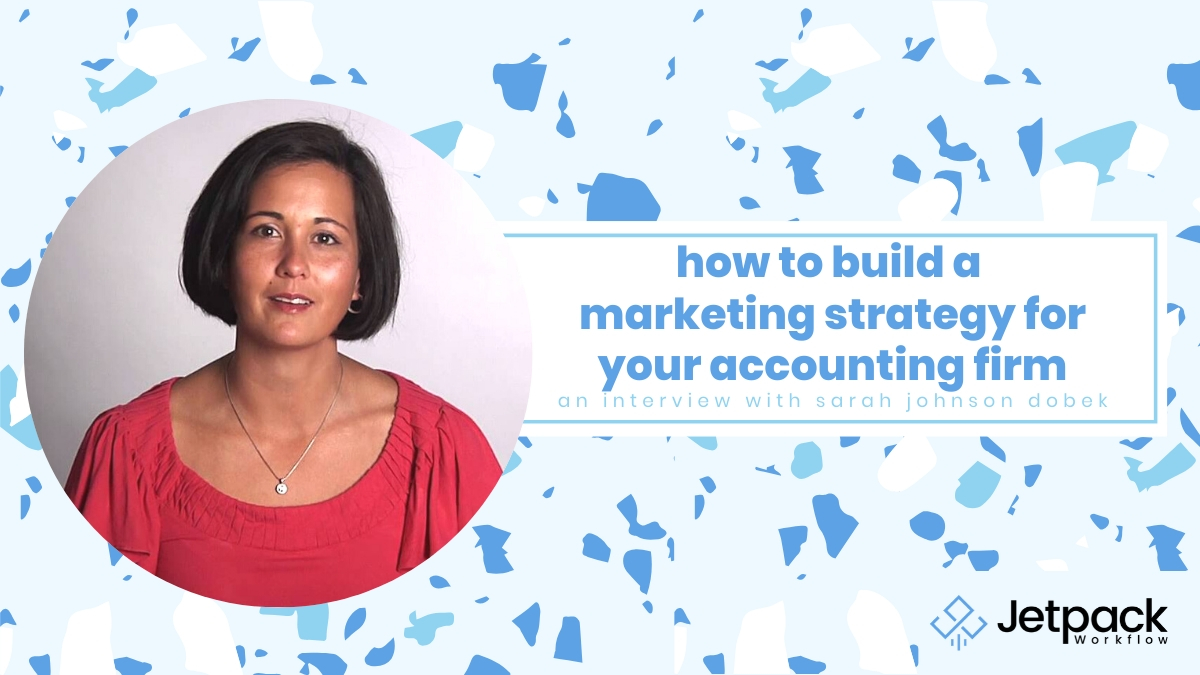How To Build A Marketing Strategy For Your Accounting Firm

Sarah Johnson Dobek, Founder and President of Inovautus Consulting, built her firm around marketing for your accounting practice. She works exclusively with CPAs and Accounting firms which is why we’re excited to get her insight to land new business.
Some of what she recommends will be controversial, but make sure you listen to the end to her one of her top social media strategies.
In this episode of the Growing Your Firm Podcast, David Cristello and Sarah Johnson Dobek cover:
- How to implement strategic growth and marketing plans
- How to define a service or industry niche
- Exciting marketing channels and how to take advantage of them for your firm
- and much more (launching marketing campaigns, outlining a marketing strategy, and more)
ADDITIONAL LINKS:
- Inovautus Consulting: http://inovautus.com/
- Sarah’s Linkedin: https://www.linkedin.com/in/sjjohnson
- The #1 way to grow your accounting practice (interview)
- 3 Ultimate Tips to Build an Accounting Brand that Stands out from all others (interview)
Where Do You Want to Grow & What is Your Value Proposition:
Sarah Johnson Dobek, Founder and CEO of Inovautus Consulting, sees everything good and bad going on in the marketing field of accounting. Unfortunately, most firms don’t know how to position themselves correctly to attract the right kind of clients.
Your first step is to define yourself. You might think all CPA firms are the same, but Sarah guarantees they are not.
The question you need to start with is: “Where do I want to grow?” then “What is my value proposition?”
As you can imagine, most firms have the same ones: “do great tax work every year.” That’s about it. But, if you’re ready to up marketing for your accounting practice, you got to get your hands dirty.
That means doing something controversial…
What’s that?
Defining a niche.
A niche is a specialty whether in an industry and/or service. Service could be international tax or SALT work because of the high degree of specialty. Sometimes a niche can be a geography, but specializing in geography doesn’t matter as much as it did previously.
An example Sarah gives is dentists. That’s a good niche to start with. A ‘fake’ niche that firms try and define themselves as is ‘healthcare’ accountants. That’s a bit too broad. There are too many specialties in healthcare to say you specialize in all of them.
How to Define a Niche:
The big question (and hold-up) owners face (or use as an excuse) is “we don’t know how to define our niche. We are good at lots of things.”
Let’s start by looking at your regional area and what niches are available. Who is serving those niches? What’s the barrier to entry? A good strategy might be uncovering under-served niches. Sarah sees governmental accounting and labor unions as under-served niches. The barrier to entry is a bit higher, but once you get over that, you can dominate the space.
That’s the sign of a good niche. Can any fly-by-night accountant compete with you, or can you find a way to wrap your arms around your area’s niche?
If you’re looking to ID a niche, look at your current client base and do a revenue segmentation. Pull out all the client data and look at gross billings over the course of a 12 month period. You can also look at tax return data as well to get industry information, and this is a good start on where to ID your strengths.
What is a clear sign of a strength in your firm?
If you have 20-30% of billings toward a service/niche, that’s a positive sign.
If you don’t have that OR you don’t necessarily like the 20-30% stuff you do, that’s okay. If you do a lot of non-profit accounting and don’t like, that means you don’t have a niche.
Next, ask yourself, “What am I and my team passionate about doing?” Maybe you want to do more tax consulting than bookkeeping. Just because you have few consulting clients doesn’t mean you can’t reposition the firm.
The only catch is, if you don’t have the expertise or experience in the firm, there will be time to get up to speed, else you’ll need to make some hires.
That timeframe to switch from general to specialized even if you have the experience can take time. This isn’t an overnight process. You do need to tweak your communications and marketing for your accounting practice pieces. On the flip side, during this transition, you can have a catch-all category that’s more generalized for referrals and new prospects that are outside your ideal niche.
At the same time, you want to be aggressive with flipping the script on how you used to market yourself, and get moving on your niche.
DAVID’S TIP: Perhaps, create ‘divisions’ in your firm as you make the transition. Have a team focused on the new niche and another division on making the transition with old clients who you might need to hand off to another firm.
In an ideal world, you have a niche-based marketing plan that complements the general plan if you think you’ll still keep some of your non-niche customers.
Sarah says the most important thing is you have growth goals for your niche. Focus your planning and strategy on building out the service line, offerings, and unique areas in this new niche.
Building a Strategy to Start the Marketing for Your Accounting Practice:
In terms of building out a marketing plan for your CPA firm or accounting practice, there are important questions to ask before spending tactical marketing dollars. They include who are you marketing to, what do they care about, what are their frequently asked questions, and what causes them to buy (ie “Buying Triggers”). Conduct a SWOT analysis of the market, competitive analysis of messages and services they’re being sold already, and outline potential channels to invest in.
Perhaps you want to build checklists or content for your clients/employees. Start with: “what do clients ask about regularly?”
Think about your goals we just mentioned about for your niche “who are you targeting specifically?” “what specifically do they want as a business?” only from there can you identify which marketing channels to explore.
In terms of the best channels, Sarah recommends a few: email, Linkedin, and if the marketplace is more blue-collar and older, print.
But, business owners and CFOs will typically already be on Linkedin.
Sarah’s best strategies for Linkedin:
- Build a network that represents you personally
- If you’re comfortable, reach out to people you haven’t met to start a dialogue
- Linkedin ads are generally a waste of money
- Promote events and your firm’s content
- Take content you’ve published on your site or personally and re-publish on Linkedin (can be done fast and pays dividends over the long haul)
Sarah invites you to reach out to her on her site as well as view her content.





